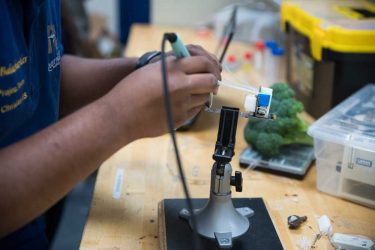
Astronauts at the International Space Station are spending more time away from Earth, but they still need their daily serving of vegetables. In the quest to find a viable way for crew to grow their own veggies while orbiting, student researchers are sending broccoli seeds coated with a healthy dose of probiotics to space.
Six broccoli seeds are aboard the Orbital ATK Cygnus spacecraft that launched last week from Wallops Island, Virginia, as part of a space station cargo resupply mission. Three of the seeds are traveling to space as is, while the other three are coated with two different species of bacteria, developed at the UW, that can live inside crop plants and improve their growth. These “beneficial” microbes, also called endophytes, may help plants grow better in extreme low-gravity environments, and in places where nutrients or water could be lacking. The goal is to learn how to grow vegetables in the challenging, microgravity conditions of the space station — and eventually on the moon and Mars — as human space exploration expands.
“It would be ideal if we could grow crops for astronauts at the space station or who are lunar- or Mars-based without needing to ship potting mix or fertilizer,” said Sharon Doty, a plant microbiologist and professor in the School of Environmental and Forest Sciences who isolated and characterized the microbes used in this experiment.
Watch the May 21, 2018, launch
https://www.youtube.com/watch?v=YXgtuIk9p3E
Read more at UW Today »
